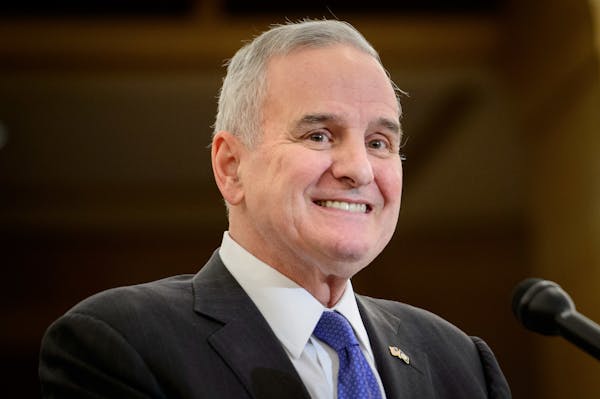With a nearly $2 billion projected budget surplus, Minnesota Gov. Mark Dayton is pressing ahead on an ambitious goal to provide universal access to prekindergarten for all 4-year-olds in the state.
The DFL governor, who originally set aside $110 million for a partial funding of the initiative, now wants an additional $238 million to fully fund his efforts, which would be largely offered through schools.
"This is a year to establish those priorities and we have the resources to be able to fund this huge step forward for the future of our state," Dayton said. "If we don't take it now, I don't know when the opportunity will present itself again."
DFL and Republican legislators largely agree on the benefits of early childhood learning, but some say that a more targeted approach aimed at low-income families is more cost-effective and would serve the greatest need. One way would be through expanding scholarship opportunities, a proposal with support from education committee chairs in both the GOP-led House and DFL-led Senate. Legislators say that while the surplus is sizable, it will also have to divvied among other deserving causes in final budget negotiations.
"With limited funds, we really do think first priority has to go to the low-income children," said Denise Mayotte, an executive committee member with MinneMinds, a coalition of a group of Minnesota foundations, nonprofits, cities and education institutions. "That's where the opportunity gap is happening right now in our state."
In an effort to ensure quality, Dayton's plan would require pre-K teachers to be licensed by the state, a goal supported by the state's teachers union, which would likely see its ranks grow.
Universal preschool is one of Education Minnesota's top legislative priorities this session.
Differences over approach
Early childhood education advocates have long argued that Minnesota needed to do more to prepare children, especially from low-income families, for kindergarten and beyond.
Several states, including Oklahoma and Florida, have adopted prekindergarten for all 4-year olds. In Illinois, research has shown early childhood education efforts aimed at low-income, predominantly black children reduced the rates of juvenile arrests and boosted high school graduation rates.
Eager to leave his mark on Minnesota education, Dayton is now championing the cause. He said he hopes that debate on how to provide preschool shouldn't derail the overall efforts.
"If this becomes another vicious food fight among the adults, the children will suffer the losses from stymying good initiatives on both sides," he said.
Rep. Jenifer Loon, R-Eden Prairie, is among a group of bipartisan legislators that have proposed legislation to expand early learning scholarships. Loon, chair of the House Education Finance Committee, said that while Dayton's $348-million proposal is worthwhile, it's expensive.
"I'm not opposed to all 4-year-olds going to preschool," she said. "I just don't think we have the money to provide that at the cost to taxpayers."
Education Commissioner Brenda Cassellius said that the governor's universal preschool is part of a broader package that would ensure middle- and low-income Minnesotans are able to afford day care.
Among other proposals is a $110-million expansion of a child-care tax credit and $19.4 million in state money to eliminate the Head Start waiting list of 2,500 children.
Cassellius said the state will continue its early learning scholarship program, which has proved popular but has been challenging to scale statewide, she said.
The scholarship program has been widely used in urban areas, such as Minneapolis and St. Paul, and half of parents receiving state scholarships choose to send their children to public schools rather than private day care. In rural areas, though, there's a lack of private day-care providers and most public schools don't currently offer prekindergarten.
A universal approach would also benefit many middle-class families who may not qualify for the grants but nonetheless feel the burden of day-care costs.
"We can't have a really limited view here," Cassellius said. "Every Minnesota kid deserves to have an excellent education, and the start of that is an early childhood education in our public schools right down the street from their home."
Staffing challenges
Under Dayton's plan, preschool class sizes would be capped at 20 students and would require a staff ratio of one for every 10 children. If adopted, it would also require that by 2020, all prekindergarten teachers be licensed in early childhood education, a lofty goal given teacher shortages in this area.
Education Minnesota argues that licensed teachers, as opposed to day-care providers that aren't licensed, is the best approach.
"There's no better bang for the education buck than increasing access to high-quality kindergarten and pre-K programs for our youngest learners, especially children living in poverty," Education Minnesota President Denise Specht said in a statement. "Increasing access to these programs must be part of any credible strategy for reducing opportunity gaps in Minnesota."
The teachers union supports the Dayton proposal and says that the formal training that licensed teachers have better prepares children for kindergarten. Transportation, often a hurdle for low-income families, would also be provided, Specht noted.
Cassellius said the state is aware of staffing challenges but said it shouldn't hinder the overall aim. "You don't not do it," she said. "You don't say, 'The barrier's too great, we can't do it' because the research is so clear that if you do it, it's going to be such a game changer."
Ricardo Lopez • 651-925-5044
Biden administration restricts oil and gas leasing in 13 million acres of Alaska's petroleum reserve
Biden's new Title IX rules protect LGBTQ+ students, but transgender sports rule still on hold
Finding an apartment may be easier for California pet owners under new legislation
Jury selection could be nearing a close in Donald Trump's hush money trial in New York

